Related Research Articles

William Paget, 1st Baron Paget of Beaudesert, was an English statesman and accountant who held prominent positions in the service of Henry VIII, Edward VI and Mary I.
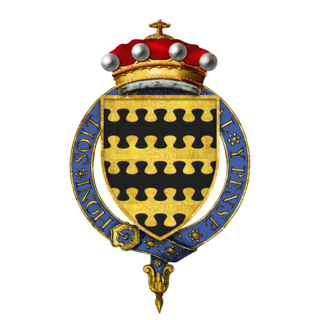
William Blount, 4th Baron Mountjoy, KG, of Barton Blount, Derbyshire, was an extremely influential English courtier, a respected humanistic scholar and patron of learning. He was one of the most influential and perhaps the wealthiest English noble courtier of his time. Mountjoy was known internationally as a humanist writer and scholar and patron of the arts.
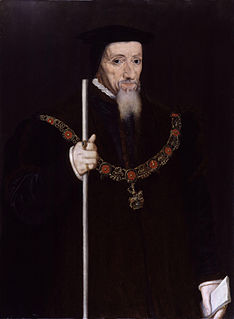
William Paulet, 1st Marquess of Winchester, styled Lord St John between 1539 and 1550 and Earl of Wiltshire between 1550 and 1551, was an English Lord High Treasurer, Lord Keeper of the Great Seal, and statesman.

George Talbot, 4th Earl of Shrewsbury, 4th Earl of Waterford, 10th Baron Talbot, KG, KB, PC was the son of John Talbot, 3rd Earl of Shrewsbury, and Lady Catherine Stafford, daughter of the 1st Duke of Buckingham. He also held the subsidiary titles of 13th Baron Strange of Blackmere and 9th Baron Furnivall.

Sir Thomas Arundell of Wardour Castle in Wiltshire was a Cornish administrator and alleged conspirator.
Henry Pole, 1st Baron Montagu, was an English nobleman, the only holder of the title Baron Montagu under its 1514 creation, and one of the relatives whom King Henry VIII of England had executed for treason.
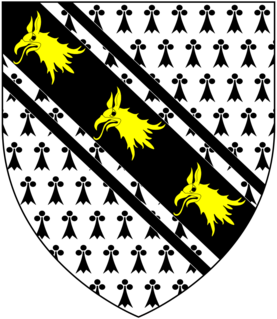
Walter Yonge (1579–1649) of Great House in the parish of Colyton in Devon, England, was a lawyer, merchant and diarist.
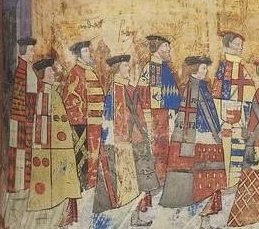
Henry Courtenay, 1st Marquess of Exeter, 2nd Earl of Devon, KG, PC, feudal baron of Okehampton, feudal baron of Plympton, of Tiverton Castle, Okehampton Castle and Colcombe Castle all in Devon, was a grandson of King Edward IV, nephew of the queen consort, Elizabeth of York and a first cousin of King Henry VIII. Henry Courtenay was a close friend of Henry VIII's, having "been brought up of a child with his grace in his chamber."

Nicholas Wadham (1531–1609) of Merryfield in the parish of Ilton, Somerset, and Edge in the parish of Branscombe, Devon, was a posthumous co-founder of Wadham College, Oxford, with his wife Dorothy Wadham who, outliving him, saw the project through to completion in her late old age. He was Sheriff of Somerset in 1585.
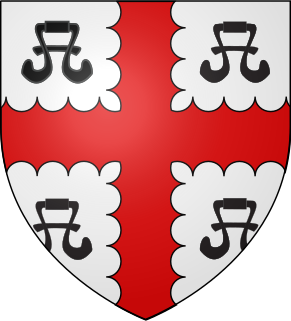
Sir John Bourchier, 2nd Earl of Bath, PC was an Earl in the peerage of England. He also succeeded to the titles of 12th Baron FitzWarin, Baron Daubeney and 4th Count of Eu.

John Paulet, 2nd Marquess of Winchester, styled The Honourable John Paulet between 1539 and 1550, Lord St John between 1550 and 1551 and Earl of Wiltshire between 1551 and 1555, was an English peer. He was the eldest son of William Paulet, 1st Marquess of Winchester and Elizabeth Capel.

William Paulet, 3rd Marquess of Winchester was an English nobleman, the son of John Paulet, 2nd Marquess of Winchester and his first wife, Elizabeth Willoughby. His maternal grandfather was Robert Willoughby, 2nd Baron Willoughby de Broke.

Thomas Grey, 2nd Marquess of Dorset was an English peer, courtier, soldier, and landowner.

Gilbert Tailboys or Talboys, 1st Baron Tailboys of Kyme was an English courtier and Member of Parliament during the reign of Henry VIII of England.

Sir Hugh Paulet of Hinton St. George in Somerset, was an English military commander and Governor of Jersey.

John Poulett, 1st Baron Poulett, of Hinton St George, Somerset, was an English sailor and politician who sat in the House of Commons between 1610 and 1621 and was later raised to the peerage.

Sir William Courtenay of Powderham in Devon was a prominent member of the Devonshire gentry. He was Sheriff of Devon in 1579–80 and received the rare honour of having been three times elected MP for the prestigious county seat (Devon) in 1584, 1589 and 1601.
Sir George Speke (c.1530-1584) of Whitelackington in Somerset was Sheriff of Somerset in 1562–63 and was Member of Parliament for Somerset 1572-83.

Sir John Strode, of the Middle Temple, London and Chantmarle, Cattistock, Dorset, was an English MP for Bridport in 1621 and 1625.
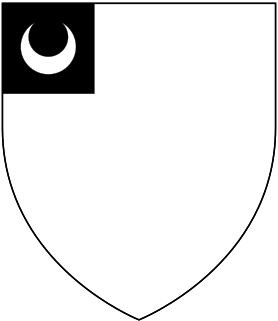
John Strode, the son of Robert Strode of Parnham, Dorset and Elizabeth Hody, was elected MP for Dorset in 1572 and was Sheriff of Dorset from 1572 to 1573.
References
- ↑ Collins, Arthur, The Peerage of England, Vol. 3, 3rd edn., 1735, London, p. 222.
- ↑ Ferguson, Charles, Naked to Mine Enemies: The Life of Cardinal Wolsey, 1958, New York, p. 65.
- ↑ Edward, Simon; Lambe, John, "Much joy and favour to you: you are the King's now": Cardinal Wolsey as a domestic patron, Royal Studies Journal, 4(2), 2017, pp. 161-176, DOI: http://doi.org/10.21039/rsj.v4i2.154
- ↑ Collins, Arthur, The Peerage of England, Vol. 3, 3rd edn., 1735, London, p. 223.
 This article incorporates text from a publication now in the public domain : "Paulet, Amias (d.1538)". Dictionary of National Biography . London: Smith, Elder & Co. 1885–1900.
This article incorporates text from a publication now in the public domain : "Paulet, Amias (d.1538)". Dictionary of National Biography . London: Smith, Elder & Co. 1885–1900.